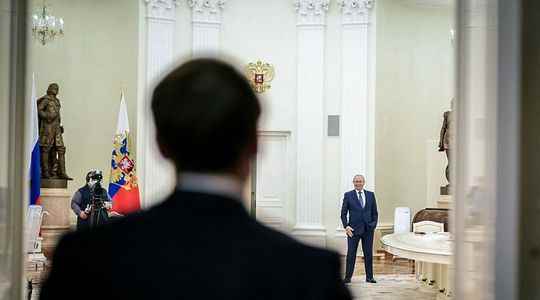Maybe it was the jokes of Volodymyr Zelensky, a former comedian who became president of Ukraine. Still, Emmanuel Macron seemed much more comfortable at the Mariinsky Palace in Kiev on Tuesday than in the Kremlin the day before. By visiting these two countries on the brink of war, the French president hoped to obtain concrete signals of a de-escalation: he will have to wait.
In the Kremlin, a meeting in the form of a duel
Faced with Vladimir Putin on Monday evening, the French president remained locked up in a room for more than five hours, with two interpreters as the only distraction. At the exit, the two Heads of State shared the podium for cordial but muscular exchanges with the press. One railed against “NATO’s aggressiveness”, the second remained firm on the necessary cessation of “military pressure” on the Ukrainian border. “Macron was extremely pugnacious and as stiff as Putin, observes François Heisbourg, special adviser to the Foundation for Strategic Research. The press conference reflected their long discussion well and a priori the blockage remains complete on the security order in Europe.”
Even before the meeting in the Kremlin, France had tempered expectations. Nobody at the Élysée hoped for a resolution of the conflict at the end of this double visit by Emmanuel Macron, Monday in Moscow and Tuesday in Kiev, even if time is running out. “There is no diplomatic scenario in which all of these subjects are settled in a single meeting, relativizes a close adviser to the French president. But the objective is to provide sufficient elements to begin de-escalation and have the means to ensure the security of the European continent in the longer term.”
Publicly, no concrete commitment has been announced by the various parties to the conflict. Some French sources have hinted that Russia would refrain from launching new military maneuvers near the borders of Ukraine, before receiving a formal denial from the Kremlin. “By nature, the role of diplomacy is to be opaque. A successful negotiation is a negotiation that is not done with an open heart, underlines Bertrand Badie, professor emeritus of international relations at Sciences Po. But the looming agenda , in line with Moscow’s expectations, is striking, with the aim of going well beyond the Ukrainian dossier to recognize a new global status for Russia.”
A very narrow space for discussion
Poor in concrete results, the meeting between Macron and Putin made it possible to clarify the state of mind of the two camps. “Since the beginning of the open crisis, the three levels of conflict had never appeared so clearly, continues Bertrand Badie: the Ukrainian-Ukrainian level, with the status of Donbass at stake; the level on the place of Ukraine in the international system and its potential membership of NATO, and the level of Russia’s status in the post-bipolar world, which basically has not advanced since 1991. This meeting provides a framework for negotiability, which which is not negligible and is to the credit of Macron.”
The French president has been trying, in recent weeks, to give a space for discussion to the various actors in the conflict. Paris brought together Russian and Ukrainian advisers around the table ten days ago to negotiate the status of Donbass, a region at war in eastern Ukraine. These discussions are part of the Minsk agreements, signed in 2015 between Moscow and Kiev. “Putin recalled at a press conference that the only way out of the Ukrainian crisis is the implementation of these agreements, points out Igor Delanoë, deputy director of the Observatory of Russia. But the Ukrainians consider that these agreements constitute a threat to their security and the Russians are not giving up.” The diplomatic advisers meet next Thursday, this time in Berlin, to try to move the file forward.
If France wants to be optimistic and wants to maintain “a demanding dialogue in the coming weeks and months”, the timetable could turn out to be much shorter – and much darker. As of Thursday, Russian troops begin major exercises with the Belarusian army along the Ukrainian border. Other massive Russian military deployments are taking place in the Black Sea and other lands. On Monday evening, Emmanuel Macron also revised upwards the number of Russian soldiers stationed near the borders of Ukraine, evaluating them at 125,000.
“Russia will be militarily ready to attack within five or six days, believes for his part François Heisbourg. But the Beijing Olympics are a brake, the Chinese would not be happy for a war to break out during their Olympic Games. must ask himself whether he is waging the war he can wage or whether he is waging peace, which is ultimately very complicated for him: he got nothing from his claims put forward in December and he should explain why he did hanging around 100,000 soldiers in snow and mud for three months.” The Chinese Games end on February 20. Enough to leave, perhaps, one last chance for diplomacy.
